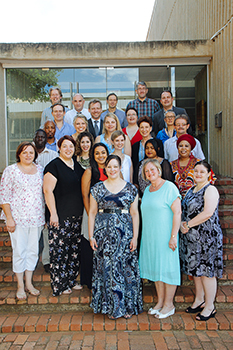Latest News Archive
Please select Category, Year, and then Month to display items
02 January 2025
|
Story Gerda-Marie van Rooyen
|
Photo Supplied
 Leading the research in South Africa is Prof Linus Franke from the Department of Soil, Crop and Climate Sciences.
Leading the research in South Africa is Prof Linus Franke from the Department of Soil, Crop and Climate Sciences.
Scientists are actively pursuing the successful breeding of diploid hybrid potatoes from inbred lines. This is expected to revolutionise potato breeding as it holds the key to rapid genetic progress. It will introduce new varieties for commercialisation through seed. Currently, existing potato variants have a gene that renders self-pollinated seeds infertile.
Prof Linus Franke, an academic in the Department of Soil, Crop and Climate Sciences at the UFS, is leading the research in South Africa. “This technology allows the production of genetically uniform potato seed that is easy to transport and largely disease-free.” He says this differs from conventional breeding whereby only vegetative propagation is possible due to tetraploid varieties in potatoes. It also risks carrying pests and diseases from one generation to the next – leading to the accumulation of pests and diseases with each round of multiplication.
Seed innovation
Prof Franke explains that Solynta BV, a seed company based in the Netherlands that produces potato varieties that can be grown from seed, has included South Africa in their research efforts because it is one of Africa’s largest producers and exporters. Through his academic relationship with Wageningen University and Research, a Dutch institution renowned for its agricultural endeavours and food production, the UFS became involved in researching hybrid potatoes grown from seed.
Diploid seeds containing two sets of chromosomes allow easier gene manipulation to increase predictability and speedier genetic progress. The breeding approach enables the incorporation of tolerance to pests, diseases, abiotic stresses (cold, heat, drought) and other desired genetic traits.
Although Prof Franke is optimistic about this research, he is not blind to disadvantages. “Potato seeds are tiny and have little energy reserves, making it harder to grow potatoes from seed than from tubers.” He says potatoes from seed will take longer to cultivate than tubers, as farmers need to grow plantlets from seeds first, adding six weeks to the growing period. “It is possible that commercial farmers can grow potatoes directly from seed. Alternatively, perhaps more likely, specialised growers will produce tubers of potatoes from seed; these tubers are then sold as seed tubers to other potato farmers, who then continue their normal practices of producing potatoes for the market from tubers.”
Financial benefits
Prof Franke says farmers have reason to get excited. “Seed potatoes will reduce input costs, as varieties with enhanced tolerance to pests and diseases require less pesticides. Planting one hectare of potatoes requires three to four tonnes of potato tubers, but only one 25 g packet of potato seeds.” Since potatoes are a more valuable commodity than maize, this technology might also increase farmers’ income potential.
Centre for Teaching and Learning honours excellence and innovation
2015-11-27

The 2015 Excellence in Teaching and Learning nominees with CTL management and Dr Lis Lange
|
Excellence and innovation. These were the qualities celebrated at the recent Excellence in Teaching and Learning Awards. Annually, the University of the Free State (UFS) Centre for Teaching and Learning (CTL) honours lecturers for their outstanding achievements in the classroom.
During the illustrious event, individual as well as group winners were announced in the category of the Vice Chancellor’s Award, as well as in several categories in the Innovation Awards. The winners of the Excellence in Teaching Awards were:
Vice-Chancellor’s Award
Individual
• Louise van den Berg (Faculty of Health Sciences)
Teaching team
• Salomien Boshoff and Naquita Fernandes (Faculty of Economic and Management Sciences)
Innovation Awards
Engagement and Learning
• Lerato Sekonyela (Faculty of Economic and Management Sciences)
• Rentia Engelbrecht, Jolandi Bezuidenhout, and Jamie-Lee Nortje (Faculty of the Humanities)
Curriculum Design
• Joyce Ras (Faculty of Economic and Management Sciences)
• Adre le Roux and Frans Kruger (Faculty of Education)
Community Engagement
• Martin Oliver (Faculty of Economic and Management Sciences)
• Ielse Seale and Karen Venter (Faculty of Health Sciences)
Assessment Practices
• Joyce Ras (Faculty of Economic and Management Sciences)
• Salomien Boshoff (Faculty of Economic and Management Sciences)
The awards serve to celebrate excellence among the university’s academic staff, while showcasing current best practice, and inspiring innovation among lecturers.
In aid of this, CTL hosted a showcase following the award ceremony. Academic staff and the broader university community could look over the various entries for new insights and added inspiration. A series of workshops and activities explored themes such as professionalism, and lectureship, as well as various apps that can be used in higher education.